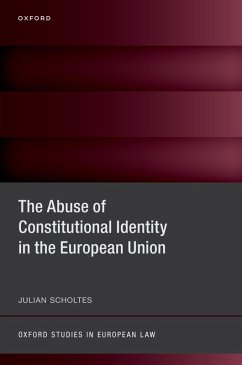The idea of constitutional identity has been central to the negotiation of authority between EU and national constitutional orders. Many national constitutional courts have declared that the reach of EU law is limited by certain core elements of the national constitution, often labelled 'constitutional identity'. With the rise of illiberal democracies within the EU, the idea of constitutional identity has increasingly come under criticism, being seen as easily embedded in authoritarian, nativist rhetoric and vulnerable to being abused. In The Abuse of Constitutional Identity in the European Union, Julian Scholtes provides novel insights into how European authoritarians have utilised the concept of constitutional identity to further their illiberal goals. Employing a comparative theoretical perspective, his book identifies the factors behind legitimate constitutional identity claims and critically analyses the ways in which these claims can be abused. Scholtes examines abuses of constitutional identity in three distinct theoretical dimensions: generative, substantive, and relational. The generative dimension looks at how constitutional identity claims come about, while the substantive dimension examines a claim's broader relation to a normative theory of constitutionalism. The relational dimension, on the other hand, considers how constitutional identity claims are advanced and whether they are employed as a means of constitutional dialogue or constitutional disengagement.
Dieser Download kann aus rechtlichen Gründen nur mit Rechnungsadresse in A, B, BG, CY, CZ, D, DK, EW, E, FIN, F, GR, HR, H, IRL, I, LT, L, LR, M, NL, PL, P, R, S, SLO, SK ausgeliefert werden.


